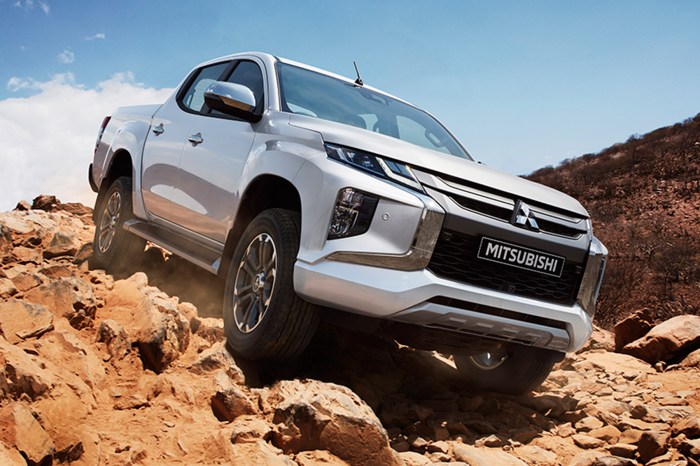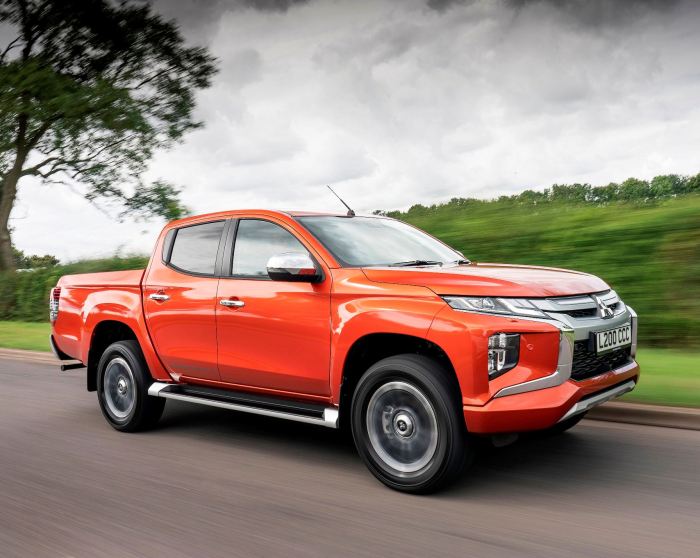Does Mitsubishi make a truck? The answer to this question unveils a captivating journey through the world of automotive manufacturing, where innovation and engineering prowess converge. From the inception of Mitsubishi’s truck production to its current position in the global industry, we delve into the intricacies of these powerful machines, exploring their features, applications, and the competitive landscape they navigate.
Mitsubishi’s truck legacy is a testament to its commitment to providing reliable and efficient transportation solutions. Their trucks have played a pivotal role in diverse industries, from construction and mining to logistics and transportation. Join us as we uncover the fascinating story behind Mitsubishi trucks, their impact on the automotive landscape, and their continued pursuit of excellence.
Mitsubishi Truck Models: Does Mitsubishi Make A Truck

Mitsubishi, renowned for its automotive prowess, extends its expertise to the commercial vehicle segment with a range of robust and reliable trucks. These trucks are meticulously engineered to meet the diverse demands of various industries, from light-duty urban deliveries to heavy-duty off-road hauling.
Mitsubishi’s truck lineup encompasses a spectrum of models, meticulously designed to cater to specific payload and towing requirements. Whether you’re navigating congested city streets or traversing rugged terrains, Mitsubishi has a truck that fits your needs.
Light-Duty Trucks
Mitsubishi’s light-duty trucks are designed for urban maneuverability and efficient payload handling. These compact and agile vehicles are ideal for businesses seeking reliable transportation solutions for local deliveries and everyday hauling tasks.
- Mitsubishi Canter Guts:With a payload capacity of up to 3.5 tons and a compact footprint, the Canter Guts excels in urban environments and narrow streets.
- Mitsubishi Fuso Canter:Boasting a payload capacity of up to 5.5 tons, the Fuso Canter offers a balance of payload and maneuverability, making it suitable for a wide range of delivery applications.
Medium-Duty Trucks
Mitsubishi’s medium-duty trucks strike a balance between payload capacity and versatility. These trucks are capable of handling heavier loads while maintaining agility for urban and regional transportation.
- Mitsubishi Fuso Fighter:With a payload capacity ranging from 7 to 12 tons, the Fuso Fighter is a versatile workhorse for medium-duty hauling operations.
- Mitsubishi Fuso Super Great:Designed for heavier loads, the Super Great offers a payload capacity of up to 18 tons, making it suitable for construction and mining applications.
Heavy-Duty Trucks
Mitsubishi’s heavy-duty trucks are engineered to tackle the most demanding off-road and heavy-hauling tasks. These powerful and rugged vehicles are equipped with advanced technologies to ensure maximum performance and durability.
- Mitsubishi Fuso Super Great V:The Super Great V is a heavy-duty workhorse with a payload capacity of up to 25 tons, ideal for mining and construction operations.
- Mitsubishi Fuso Shogun:Designed for extreme off-road conditions, the Shogun features a robust chassis and powerful engine, making it a reliable choice for remote and challenging environments.
History of Mitsubishi Trucks
Mitsubishi’s truck production journey began in the early 20th century, shaping the global truck industry with its innovations and milestones.
In 1917, Mitsubishi Heavy Industries (MHI) launched the T1, Japan’s first domestically produced truck, marking the inception of Mitsubishi’s truck manufacturing legacy.
Mitsubishi’s Early Truck Production
- 1932: MHI established the Tokyo Automobile Works, specializing in truck production.
- 1934: Mitsubishi released the PX33, a 7-ton truck designed for heavy-duty transportation.
Post-World War II Era, Does mitsubishi make a truck
Following World War II, Mitsubishi resumed truck production in 1946, introducing the T620 light truck.
- 1959: Mitsubishi introduced the Fuso T90, a medium-duty truck that gained popularity for its reliability and versatility.
Global Expansion and Innovations
Mitsubishi expanded its truck production internationally, establishing joint ventures and manufacturing facilities worldwide.
- 1970: Mitsubishi formed a joint venture with Chrysler Corporation, establishing the Mitsubishi Motors Corporation (MMC).
- 1983: Mitsubishi introduced the L300, a compact pickup truck designed for both commercial and personal use.
- 1992: Mitsubishi released the Pajero, a popular sport utility vehicle (SUV) known for its off-road capabilities.
Recent Developments
Mitsubishi continues to innovate in the truck industry, focusing on sustainability and advanced technologies.
- 2006: Mitsubishi introduced the eCanter, an all-electric light-duty truck.
- 2017: Mitsubishi launched the Fuso eCanter, an upgraded version of the eCanter with increased range and payload capacity.
Mitsubishi Truck Features and Technologies
Mitsubishi trucks are renowned for their innovative features and cutting-edge technologies that enhance performance, efficiency, and safety. These advancements cater to the diverse needs of commercial transportation, from heavy-duty construction to urban delivery.Mitsubishi’s advanced powertrains deliver exceptional fuel efficiency and reduced emissions.
The MVG engine, available in various models, combines high torque with low fuel consumption, ensuring optimal performance and reduced operating costs. The Super Select 4WD system provides superior traction and handling on challenging terrain, enabling trucks to navigate off-road conditions with confidence.
Safety Enhancements
Mitsubishi trucks prioritize driver and passenger safety with a suite of advanced features. The RISE (Reinforced Impact Safety Evolution) body construction enhances structural integrity, providing protection in the event of a collision. Active Stability Control (ASC) and Traction Control System (TCS) enhance stability and prevent skidding, ensuring a secure driving experience.
Connectivity and Convenience
Mitsubishi trucks integrate advanced connectivity features for enhanced fleet management and driver convenience. The Mitsubishi Connect telematics system allows fleet operators to monitor vehicle performance, track location, and diagnose potential issues remotely. The user-friendly infotainment system offers seamless integration with smartphones, providing navigation, entertainment, and communication options.
Mitsubishi Truck Applications

Mitsubishi trucks are renowned for their versatility and reliability, making them a preferred choice in various industries and applications. From construction sites to transportation fleets and mining operations, Mitsubishi trucks have proven their capabilities in demanding environments.
Construction
In the construction industry, Mitsubishi trucks are highly valued for their robust build and exceptional payload capacity. They are commonly used to transport heavy materials, such as concrete, steel beams, and equipment. The trucks’ maneuverability and off-road capabilities allow them to navigate challenging construction sites with ease.
Transportation
Mitsubishi trucks are also widely used in the transportation sector, particularly for long-haul and heavy-duty applications. Their fuel efficiency and durability make them ideal for transporting goods over long distances. Additionally, their spacious interiors provide ample room for cargo, ensuring efficient and cost-effective transportation.
Mining
In the mining industry, Mitsubishi trucks are essential for transporting minerals and heavy equipment. Their rugged construction and high torque engines enable them to handle extreme terrain and heavy loads. Mitsubishi trucks are also equipped with advanced safety features to ensure operator safety in hazardous mining environments.
Mitsubishi holds a significant market share in the global truck industry, particularly in the medium-duty and heavy-duty truck segments. The company’s market share varies across different regions, with a strong presence in Asia, the Middle East, and Africa.
Mitsubishi’s major competitors include:
- Hino
- Isuzu
- UD Trucks
- Fuso
- Volvo
- Scania
- MAN
- Mercedes-Benz
These competitors offer a wide range of truck models, from light-duty pickups to heavy-duty mining trucks, with varying levels of technology and features.
Mitsubishi maintains its market share through:
- Product innovation: Mitsubishi invests heavily in research and development to introduce new technologies and features into its trucks.
- Customer service: Mitsubishi provides excellent customer service, including parts availability, maintenance support, and driver training.
- Strategic partnerships: Mitsubishi forms strategic partnerships with other companies to expand its product offerings and reach new markets.
Conclusion
In conclusion, Mitsubishi’s presence in the truck manufacturing industry is undeniable. Their unwavering commitment to innovation and customer satisfaction has earned them a well-deserved reputation for producing high-quality, dependable trucks. As the automotive landscape continues to evolve, Mitsubishi remains at the forefront, embracing technological advancements and adapting to meet the ever-changing needs of the global market.
Their trucks stand as a testament to their engineering prowess and dedication to providing reliable and efficient transportation solutions.